Don't wanna be here? Send us removal request.
Photo
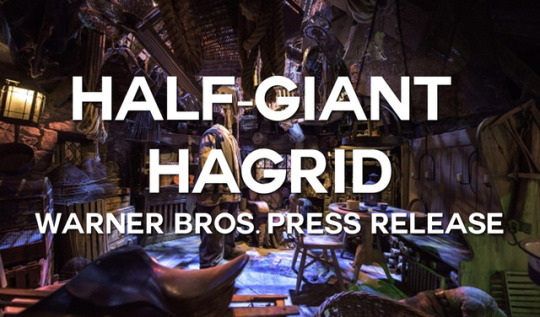
This is a Press Release that I wrote for Warner Bros. Studio Tour, Leavesden. The PR was sent out to publicity agents and can be found online, however the exhibition is no longer on.
This Easter, a huge surprise is in store for film fans as Warner Bros. Studio Tour London reveals the colossal efforts taken by producers, costume designers and thespecial effects teams to create Hogwarts’ famous groundskeeper – Rubeus Hagrid. The character who reveals the wizarding world to Harry Potter is celebrated during a special feature where lovers of the film series can understand what went into bringing this half-giant to life on screen. From March 25th to April 17th 2016, visitors to the Studio Tour will see the costumes worn by Harry’s gargantuan guardian and find out how they turned 6’1” Robbie Coltrane into the half-giant Hagrid. During production two costumes were created for Hagrid, one which was worn by Coltrane and the other which was made 25 per cent larger and usedby 6‘10’��� England rugby star Martin Bayfield who appeared as Hagrid in scenes where he needed to be bigger than the setting around him. In order to exaggerate Bayfield’s already significant frame, his suit was adapted to increase his size. As well as his complete costume, a deconstructed version will be featured at the Studio Tour showing the techniques used to create the gigantic character. As Bayfield had to wear the outfit for extended periods a special cooling system was incorporated to help him cope with the heat. Tubes were stitched into the fabric which had cold water running through them to bring down the temperature. As fans of the first film will remember, Hagrid wears an oversized coat made from moleskin. As the costume department wanted to stay true to the description, they cut imitation fur into mole shapes and sewed them together, each complete with tiny ears and tails. In addition to Hagrid costumes, filmmaking experts from Nick Dudman’s team will be working in the Creature Effects department. One of the early encounters that Harry has with Hagrid is a trip to the vaults of Gringott’s and the team will be demonstrating techniques used to create the prosthetic masks worn by Goblins at Gringott’s bank.Made from silicon, each one was given a particular personality to ensure they all looked different.
Words Alex Wallace
0 notes
Photo
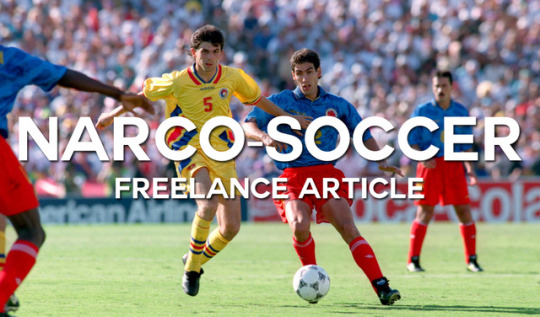
Narcos, Pablo’s football boots and the greatest save that almost never happened.
The lowest attendance of any of England home game for 6 years, Jamie Redknapp’s England debut was on the 6th September 1995; he was subbed off in the 75th minute. Final score: 0-0. Shocker. His only impact was helping Columbian keeper René Higuita make the most famous save in history halfway through the first half - yes, the scorpion kick. Poor Jamie was humiliated in front of just 20,000 people.
Whilst everyone has seen the save, its little known that Higuita almost missed the match due to his arrest in 1993 for involvement in a cartel kidnapping; he had complications with his paperwork when flying into the UK and only met up with his teammates the morning before kick-off. This wasn’t unusual in 1980s Columbia; it was a country full of rebel insurgents, illegal drug trading and internal violence, corruption bled into every walk of life – even sports.
It’s hard to separate crime and football when sieving through the Columbia’s past - when their first professional league the Dimayor (the national football league) pulled away from Adefútbol (the FIFA recognized regional league system) in 1949, teams in the Dimayor realized they no longer had to adhere to FIFA rulings on transfers. This meant being able to use shady government money to bypass transfer fees and entice players with a considerably high wage; particular coups include Charlie Mitten, Alfredo Di Stéfano and Héctor Rial. But due to the bootlegged-nature of the league these players inevitably moved on and left the league in debt and disarray.
Not much changed in the following years, the brief triumph of qualifying for the 1962 World Cup soon collapsed after a 5-0 defeat to Yugoslavia eliminated them in the group stages. Alongside their sporting failures Columbia’s problems were worsened by the increase in violence and the fact that cartels were moving enough cocaine to make Tony Montana look like Garry O’Connor.
Enter Pablo Escobar. More than just the coke slinging, family murdering drug lord you see in Narcos, Escobar had a deep-rooted love for football. A right-footed left-winger, he was like Niall McGinn with a nicer collection of leisurewear, cutting inside and planting one in the top corner past the scared-shitless goalie on the streets of Medellín.
“His first shoes were football boots, and he died in football boots”.
Escobar only played casually but he invested heavily in his hometown clubs, namely Atlético Nacional and was well known for building pitches, schools and stadiums in impoverished areas of Medellín. With his backing Nacional went on to win Columbia’s first Copa Libertadores in 1989; as well as just missing out on the Intercontinental Cup after a 119th minute goal by AC Milan’s ‘Immortals’. What followed was international success as Higuita was flipping off Jamie Redknapp and El Pibe was tearing up defences in the ‘90 and ’94 World Cups. The footballing achievements from Columbia throughout this time united areas of the population and gave them something to be proud of despite the political conflicts that riddled the country.
This transformation in sporting ability was no coincidence however, Nacional had significantly more money than other clubs in the league; Escobar also started a trend for other cartel leaders to invest in their local clubs, using turnstile admissions to launder their dirty money. Pablo became good friends with the Nacional team, he’d host private 11v11 matches at his house for him and his associates to bet on: over 2.5 goals? To score in 90 minutes? Goalie’s son to make it home alive?
The toxic nature of ‘narco-soccer’ soon spread and soon most Dimayor teams were in some way funded by a cartel. The murder of Andres Escobar, who scored an own goal against Columbia, is one of the most famous tales from this era; 5 years earlier a similar incident occurred at the hands of Pablo Escobar, who ordered the assassination of Alvaro Ortega, a referee who stopped Medellín club DIM from beating America di Cali. In 1989 this led to several promises about how the Columbian game would be cleaned up, followed by similar claims in 1990 by new president Cesar Gaviria. But ultimately nothing changed.
Gaviaria managed to get Escobar to hand himself in 1991, he was allowed to build his own prison ‘La Catedral’, which of course had a football pitch on it. Inviting friends from his Nacional days Pablo hosted games against the guards, it was even graced by Maradona on one occasion – probably had a hell of a party after that one.
Pablo went on the run from his prison in 1992. His partner through this, Popeye, tells a story of when they were hiding from soldiers in a ditch, they were being slowly surrounded and instead of paying attention, Escobar was listening to Columbia play a qualifier on his pocket radio. “Football was his joy,” Popeye said in an interview “his escape. His cloud nine.”
The death of Pablo was not the end for ‘narco-soccer’ however, illegality continued to infect the sport throughout the 1990s. This began with the incalculable murder of FA executive Arturo Bustamente at the turn of the decade, the assassination of the club presidents of DIM and Deportivo Pereira and the famous killing of Andres Escobar followed in 1994. It became impossible to tell where the criminality stopped and the football began, the president of the Columbian Football Federation was jailed in 1997 and in a WC match that year Anthony De Avila openly told the press that he dedicated his 86th minute winner to the Cali Cartel leaders - the Rodriguez Orejula brothers.
Things began to change on the surface in 2001 when Columbia were set to host the 2001 Copa America; however following the kidnapping of CFF head Hernan Campuzano it was decided that the tournament should be played elsewhere. This was until Campuzano was released a day later and Columbia was allowed to host the tournament promising a halt to the violence. The ceasefire was kept and the hosts won the tournament for the first time in their history (and did it without conceding a goal).
This was another high point in the country’s sporting history, mirroring the atmosphere of the 1980s, where despite political unrest and misconduct – the sport still brought people together. Columbia have since qualified for the 2018 World Cup and had the top scorer in the 2014 tournament, almost making it to the semi-final. The corruption and deceit however is still known to be brewing underneath the surface of the sport, only two years ago was the president of the CFF convicted once again; however the joy that the sport is bringing and the success that the national team is achieving mean that, at least on the surface, there is some footballing delight at the end of the tunnel for Columbia.
0 notes
Photo
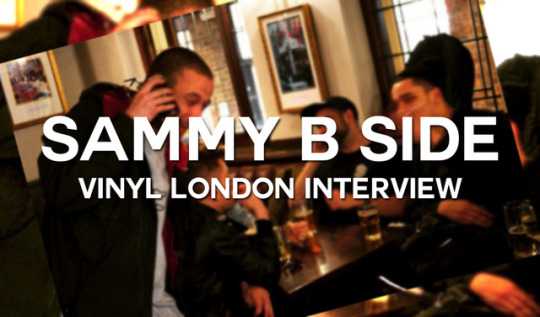
Sammy B-Side Exclusive Interview and High Focus x Deal Real In-Store Cypher
Walking into Deal Real on a Wednesday afternoon you wouldn't be far wrong if you thought it was closed, a couple of employees chatting behind the counter and a small selection of hip hop vinyl on the wall is what makes up the top floor of the legendary Carnaby record store. Walk downstairs and you'll see Sammy B-Side stretching tangled wires around decks, laptops, speakers and mixers - trying to get some sort of sound from the setup in this basement venue.
45 minutes, some casual chit chat, a new extension lead and numerous cans of Red Stripe later, we finally have lift-off. The speakers are working and a host of UK hip hop stars enter: Dirty Dike, Fliptrix, Leaf Dog and more. Passing this group on the street you wouldn’t think they were anymore than a normal group of geezers going out after a day at work, they don’t drape themselves in chains and expensive designer labels like American rappers, they encompass the charm of UK rap in their subdued and gritty style.
A wooden pallet is laid down next to the decks as a stage, Sammy puts a beat on and the room begins to fill up. Performances from Jam Baxter, Ronnie Bosh, Onoe Caponoe, Lee Scott and the rest of the High Focus gang make the small room come alive with such a simple set up. The entire operation epitomizes UK Hip Hop for me, the room was far from a concert hall, the wiring for the decks looked like something the back of my TV and the sweaty intimacy of the 8x14 foot room all came together to create one of the most exciting live performances I've seen. The artists were fairly buzzed off Jack Daniels, Red Stripe or anything else they had in their pockets yet still gave everything as they delivered new material, old crowd favorites and shout-outs to their crew.
After the gig I contacted Sammy B-Sides the High Focus DJ on the night and asked him about UK hip hop, vinyl and his influences.

What's your name and where are you from?
Hello, hi, safe and good day. DJ Sammy B-Side, born in London, raised in Cambridge
Why did you start DJing and how did you meet the guys from High Focu?
I guess the DJ seeds were sown after being fully bitten by the Hip Hop bug at a young age. I was obsessed with the music and everything to do with it, I still am. The thought of getting turntables and embarking on the Disk Jockey aspect I think first came about after seeing an old VHS of the DMC’s and it literally blowing my tiny child mind to pieces. I was like, “WHAT THE FLYING FUCK IS THIS?? I NEED TO KNOW MORE ABOUT THIS, I NEED TO KNOW MORE ABOUT THIS RIGHT NOW”. It was massively inspiring. I think it was that, along with really rating the vibe that cuts and scratches created on the choruses and skits of tunes I liked, were the two main things that really pushed me to get turntables and start the DJing.
High Focus wise, we were all just friends messing about with music before the label ever even existed. I went to school with Edward Scissortongue and grew up in the same city as Dike and Mr Key, I guess the universe of music and rinse then gradually pushed everyone else together somehow and it just kinda happened. Natural. Fun. Vibe.
HF is like a big family of jokes and good noise. A family where all the members and relations smack it stupidity hard. Even the weird sunken-eyed uncle who is always too mashed to eat his Christmas dinner (Baxter) and the oddly tall sister who is constantly changing her hair and debating new moisturisers (Scissor).
What got you into vinyl mixing?
When I stated DJing there was no Serato or controllers, so mixing with vinyl was really the only way. I mean, CDJs were kinda about, but I never considered them as an option. Everyone who I looked up to used turntables and vinyl. Plus, having learnt the role vinyl played in Hip Hop history and fallen in love with the potential creative possibilities of turntables, it was obvious to me. I do use Serato now, but I am glad it was not about when I was first getting into the whole thing. There is something unique and special about the vinyl experience that you simply cannot beat.
What's your favourite Vinyl you own to play out and what's the one you most personally value?
Fuck man, that’s a tough one. I got a bunch that hold a great deal of personal value, but I guess the first one that springs to mind right now is my copy of “100 MPH Backsliding Turkey Kutz” which the ultra-legendary DJ QBert was kind enough to sign for me when I warmed up for him one time. I like that one.
For playing out I'm going to go with Million Dan - “Dogz N Sledgez”. Fully credible UK power murker. I must have dropped that tune about 23 thousand times over the years.
What kind of music did you listen to growing up and what are you listening to now?
When I was growing up I listened to everything from The Deftones to DJ Hype, but once I found Hip Hop, I knew I had stumbled across something I wasn’t going to let go of.
A lot of people in the scene tell me they don’t really listen to much UK Hip Hop now that they do it full time themselves, but I still listen to a shit tonne. I do think it’s important not to be tunnel visioned about these things though. I mean fuck, music is a massive multi-faceted universe, and I enjoy travelling to as many of its far flung regions as my mood chooses to take me too. Currently I seem to be going through a garage phase, but I will give anything a go.
What's the biggest misconception about UK Hip Hop and what's actually true?
I guess a misconception that some people might have, or maybe used to have a lot more, is that it’s really just a London centric thing. I hear fully heavy UK Hip Hop from all corners, all the time, the levels are there. I mean, I think they always have been, but it’s now slowly becoming more apparent to more people. UK Stand up. Bang bang.
What can we expect to see in the future from you and the label?
From High Focus you can expect to see a lot more of the unadulterated heavy music mega smack that has always been brought to the table by the team. I have heard a bunch of the new projects coming and trust, they are nothing short of molten fire crack.
You can catch my cuts on the new Dirty Dike album and the new Ocean Wisdom album, as well as the new Skuff album, the new Moreone album n the new Black Josh n Pete Cannon EP, which are all about to drop on various labels. I also got a website that is nearly ready, maybe it will be ready by the time this interview goes out. Why not click the link right now and find out, (http://www.djsammybside.com/) probably a good shout to make it your homepage and forward it to your mum and all her friends while you're at it too.
And finally, any other comments?
Maximum and unmitigated shouts to my HF/CP/SMB teams, and big up each and every person doing their damn thing out thurrrr. Salute.
DJ Sammy B-Side Social Media links: https://www.facebook.com/DJSammyBSide https://twitter.com/DJSammyBSide http://djsammybside.bandcamp.com/ https://instagram.com/djsammybside/ https://soundcloud.com/djsammybside
0 notes
Photo
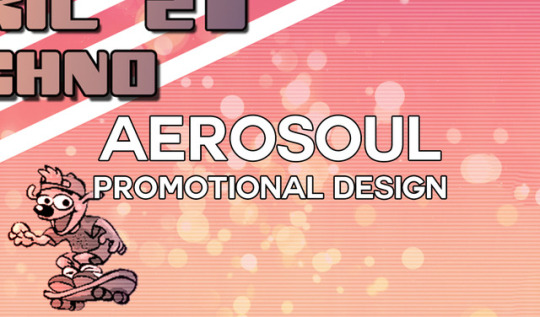
I was commisioned to design two posters for separate London nights by the collective Aerosoul. They specialise in disco and techno and wanted me to a make a series of posters and flyers for them to hand out to promote their event. I decided to go with different themes for each three and let them choose which they preffered. I created a minimalist grey/orange scheme which they thought was too serious, a ‘rising sun’ themed red and yellow one which was judged to be too plain and finally the pink ‘bubbles’ design which was chosen. I added a vintage ‘TV’ effect to some of the text and to the bottom half of the poster to reflect the age of the music being played - 80s and 90s disco/techno.
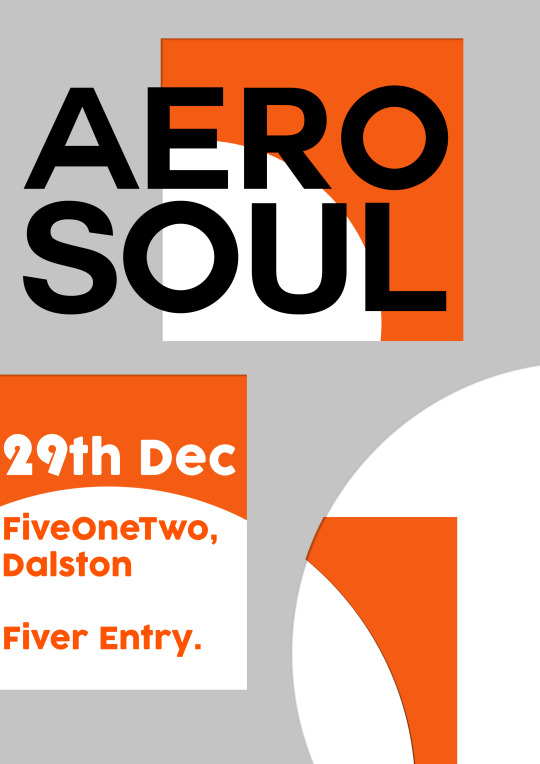
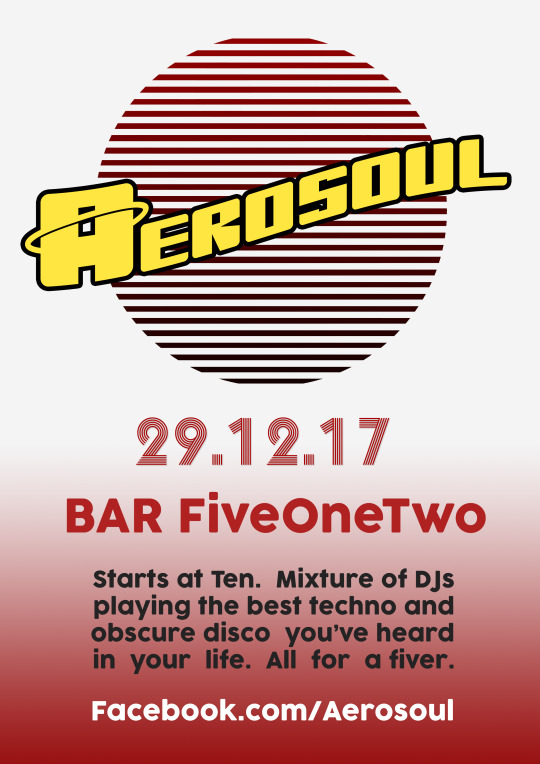

0 notes
Photo
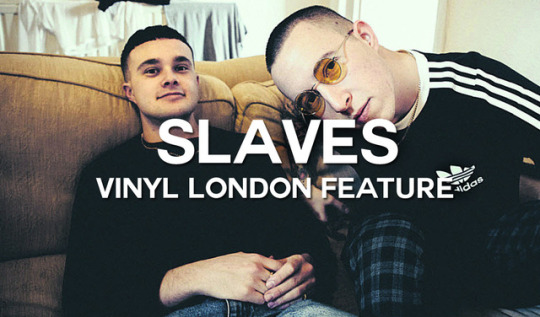
"PUNK'S NOT DEAD!" is the kind of thing you'd expect to see scribbled on a toilet wall at your local KFC - scribbled by some angsty teenager that lives with his parents; however Tunbridge Wells band Slaves are reviving the 70s genre in one of the greatest musical comebacks yet. The dangers of trying to bring back a genre which so accurately represented the anger and explosive nature of an entire generation mean it can so easily be turned into something it's not, I'm sure bands such as Blink-182 and Green Day didn’t want their music to be as 'pop-punk' as it ended up being however there was always something lacking that separated modern punk from its original form. The Britishness of the genre is vital to its origins, bands like The Clash, The Jam, The Sex Pistols; taking influence from Northern Soul, blues and dub all reflecting the anti-establishment ideologies which were bubbling under the surface at the time. Slaves have authentically created their own wave of punk music using the original music of the 70's as an inspiration to express themselves and their own rage, rather than trying to copy the feelings of a previous era.
Similar to grime music in the early 2000's, punk was opposed by the bureaucracy, it scared the them that marginal groups of people could unite under one umbrella and gain a platform to oppose them. The similarities in attitude means it's no surprise that this Punk-Grime mashup bangs as hard as it does. The Streets' Mike Skinner gets LOTM legend Jammer on vocals for his remix of 'Cheer Up London', one of the hit singles from Slaves' upcoming album 'Are You Satisfied?'.
The single is a big two fingers to boring city fat cats with the only lyric focusing on the duo shouting the phrase 'You're dead already, dead dead already' repeatedly, over some mental guitar riffs and drum smashing. This is where garage hero Skinner steps in and adds some bass cannons that'll make your room shake followed by some Jammer bars over the most gangster piano chords you’ve ever heard. The punk duo have already shown their love for the grime scene when they covered Skepta's 'Shutdown' in the Radio 1 Live Lounge a few weeks ago, so I'm staying hopeful for more punk/grime crossovers in the near future.
youtube
Listen to the track above and pre order 'Are You Satisfied?' from iTunes before it comes out on June 2nd.
0 notes
Photo
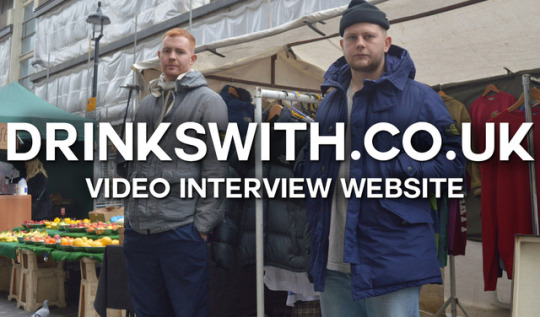
At uni I started a wesbite with some friends to give exposure to young creatives doing their own thing.
We had a very limited budget and would often have to work around exams and deadlines, however I’m very proud of the work here which I produced and helped direct and edit.
I also learnt basic HTML to give this venture its own personal website at http://www.drinkswith.co.uk
0 notes
Photo
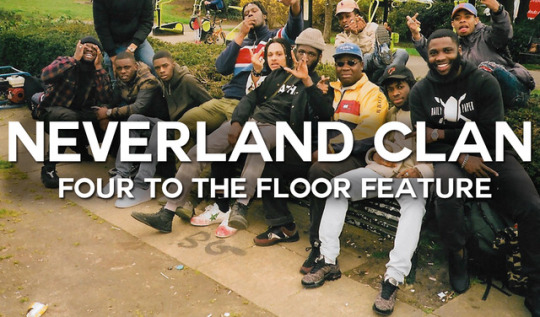
youtube
Broadcast on Channel 4 late night music show Four to the Floor
Production Company Lemonade Money
Worked as an intern on this and other shoots of live music performances
0 notes
Photo
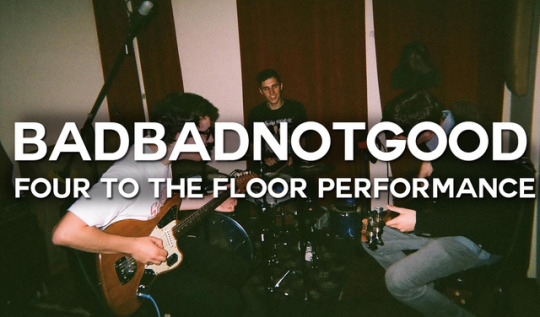
youtube
Broadcast on Channel 4 late night music show Four to the Floor
Production Company Lemonade Money
Worked as an intern on this and other shoots of live music performances
0 notes
Photo
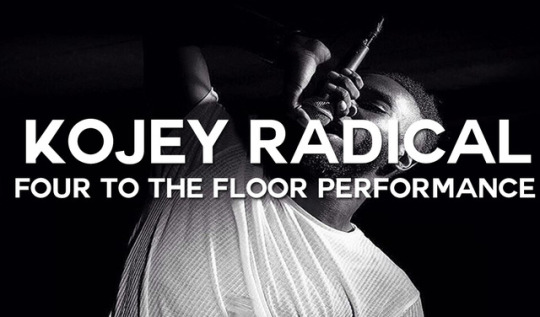
youtube
Broadcast on Channel 4 late night music show Four to the Floor
Production Company Lemonade Money
Worked as an intern on this and other shoots of live music performances
0 notes
Photo
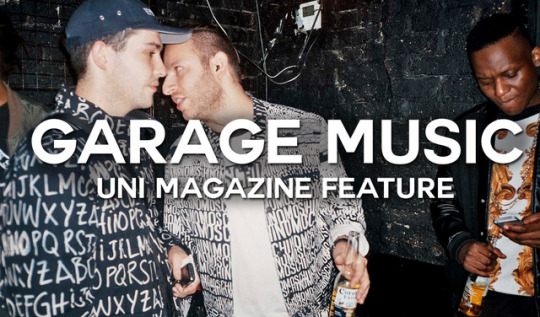
People, Just Do Something Different
Whenever mainstream culture is developed into something new, it is always followed with a counterculture. The latest trend involves listening to Skepta, wearing skinny Adidas tracksuits and calling all your mates ‘wasteman’; however as with anything new there are always people pushing the boundaries into different territories. To counter the rise of these 2004 ‘back of the bus’ wannabe’s people have been looking 10 years earlier, to 1990’s garage.
Rather than heading to Fabric in their Ralph Lauren caps and Air Maxs, people are reviving the garage scene by wearing loafers and Versace shirts to independent clubs in Hackney and Peckham. Often a slightly older crowd, you’d quicker find yourself being offered a swig of brandy by a 25 year old, than have some drugged-up 18 year old shouting at you: ‘I got a black ski mask, but I don’t ski!’
BBC Three comedy ‘People Just Do Nothing’, about pirate garage station Kurupt FM, is definitely a big reason for this resurgence of the 90’s scene. When the crew brought out old school legend Craig David to their #SixtyMinutesLive on Radio 1 Xtra, the video went viral as Craig sung his famous ‘Fill Me In’ over the beat of Bieber’s ‘Where Are U Now’. The show has recently been commissioned for two more seasons and part of the massive love for it comes from the fact that whilst the show is a parody of the underground pirate radio scene, all of the cast and crew have a huge knowledge and love of the culture they’re portraying. You’ll often see the lead MC Grindah with his sidekick DJ Beats dripping in retro Nike, Moschino and Polo Sport, with plenty of chains and gold rings to boot, listening to Artful Dodger and So Solid Crew.
In hindsight, this lifestyle has been coming back for a while now, what with the success of ‘Wavey Garms’ and, in a similar way to the original rise of garage, people wanting a night out where they can relax. People are tired of bouncing up and down for 6 hours screaming whatever the latest Kanye West release is, they want to do the OG shuffle and chat with their mates without having their drink slapped out their hand by some geezer who cant see straight. And that is what the appeal of garage was when it was at its roots, whilst its become known for the flashy suits and expensive drinks, what it really was about is just a group of people all wanting to un-wind and listen to some good music, the image that came alongside it was just a consequence. However it is this image, the memories, the analog photographs that have survived the last 20 years, which people are now trying to replicate. This brings in worries of where the garage scene can be taken in 2015, we’ve already seen people like Craig David, DJ Luck and MC Neat and Sunship start performing again around London; however the threat is that, because people are trying to relive an era gone by, that it won’t be as good as the original and risks becoming a caricature of its true self.
Despite these worries, the future of the culture is in the hands of the marginal masses, us, the young generation of London’s early-twenties who will either run the scene into the ground or re-invent it for the 21st century. So, in the words of garage legend Mike Skinner: “Let’s push things forward”.
Words by Alex Wallace
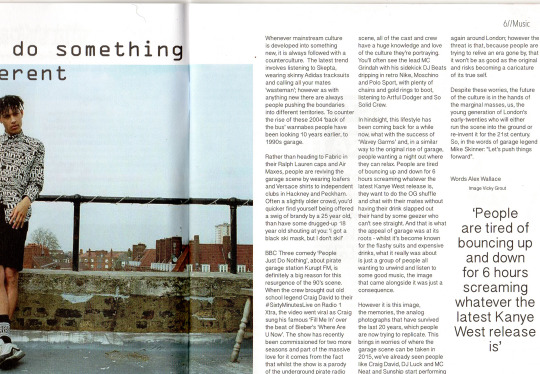
0 notes
Photo
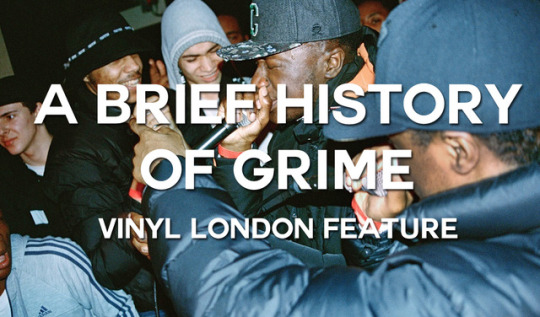
In case you’ve been asleep for the past year or if you didn’t hear Dizzee blaring from a Motorola RAZR at the back of the school bus in ‘03, you may be slightly lost now all your friends are wearing Air Max 95’s and Sport’s Direct caps calling each other ‘roadmen’. Fear not however, here is the perfect guide to the history of grime, the best tunes of the last 13 years and who to look out for in 2015.
Grime really emerged as a combination of US hip hop and UK garage. Garage was the music played in London clubs in the 90’s and early 2000’s. Mainly 2-step beats and no lyrics however, the genre was taken to the next level by producers such as MJ Cole, Artful Dodger, Wookie and people like Craig David who created a much faster and more soulful sound (see the bottom of this article for some examples). The genre sat around for a few years, and was mainly popular in London clubs with people like DJ EZ even getting MC’s to rap over garage beats and hype up crowds. Luckily however pirate radio stations like Rinse FM, along with artists like Wiley, DJ Slimzee and the Roll Deep crew began adapting the old UK Garage sound, with harder beats and more rapping which then became grime.
Wiley, seen as the founder of grime, began making his own instrumentals which he called 'eskibeat’ in 2001, leading to a deal with XL Records and his first chart single 'Wot Do You Call It?’. By this point garage had officially been overtaken by grime in London - Rinse, Kiss and BBC Radio 1 Xtra blared Dizzee Rascal, Kano and Wiley’s debut albums spreading them from the confines of East London to the whole of the UK. However, the genre did have violent connotations, Lethal B’s 'Pow’ was banned from clubs in 2004 and Her Majesty’s police force did a fine job of shutting down raves meaning that grime never really escaped from the UK to become global. Obviously this is a very brief overview and look up old 'Risky Roadz’ or 'Lord of the Mics’ video’s if you want to really get into the roots of London grime. From this point grime went a little flat, Dizzee made dance/house tracks like 'Bonkerz’, Skepta with 'Bad Boy’ and 'Amnesia’ - and when Wiley got to number one with 'Heatwave’ a few years ago, people thought grime was truly a thing of the past.
Recently however grime has been making somewhat of a comeback. 1 Xtra’s DJ Target (one of the OG Roll Deep members) along with London artists such as Tempa T and Logan Sama have been working hard the last 5-or-so years to really bring grime back into the mainstream. Chart hits such as 'German Whip’, 'That’s Not Me’ and 'Rari WorkOut’ in 2014 all managed to remind people just how hard the grime sound was. Recently Drake’s instagram has been clogged with quotes from 'Top Boy’ as well as videos of old SB.TV and LOTM battles, A$AP Rocky has been seen in the studio with Skepta and even Kanye West got a host of grime dons from the old and new school to be on stage with him at the Brit Awards in full black tracksuits. By allowing these international artists to embrace the London culture and share it on a global platform, it has given grime a new lease of life and set 2015 up with high expectations for the genre.
We can look forward to Skepta’s new album 'Konnichiwa’ which is set to be a banger, as all 3 singles so far are being played in almost every club in England at the moment. Wiley’s 'On A Level’ from last year is still being aired on the radio and even Dizzee returned to his roots with 'Couple of Stacks’ and 'Pagans’ which just goes to show that even the OG gang are back to their best and embracing this new generation of grime, paving the way for newcomers such as Novelist, The Square, Stormzy and Solo 45 (if you haven’t heard of these guys yet you’re gonna want to get to know them now before they blow up over the next 12 months). Below is a list of some of the iconic grime tracks, my favourites, and some tunes from the last 12 months to get you set for what is shaping up to be the biggest year for grime yet.
Recommended Listening:
Garage
· Ramsey and Fen - Love Bug (Original 2-Step garage sound)
· Artful Dodger - Movin’ Too Fast (Faster and more soulful garage)
· Zed Bias - Neighborhood (The most well known UK Garage sound)
Original Grime
· Wiley - Wot Do You Call It? (One of the original grime tracks)
· Dizzee Rascal - Stop Dat, Jus’ A Rascal (2 iconic tracks from his first album 'Boy In Da Corner’)
· Kano - P’s and Q’s
· Wiley on Rinse FM December 12th 2006 (One of my favourite grime set’s after the beef with Gods Gift )
· Lethal Bizzle - Pow! (If you haven’t heard this I don’t know where you’ve been)
· Skepta - I Spy, Autopsy (Two of the best beats and hardest of Skepta’s original tunes)
· Ruff Sqwad - Together ft. Wiley
· Wiley - Bow E3, Getalong Gang, 50/50
· D Double E - Streetfighter Riddim
The Grime Resurgence
· JME - 96 Bars of Revenge, Don’t Get Rude
· Skepta - That’s Not Me, Shutdown, Dark
· Wiley - On A Level
· Stormzy - Not That Deep, Where Do You Know Me From
· Solo 45 - Feed 'Em To The Lions
· Novelist - Take Time, 1 Sec, 10/10
Words by Alex Wallace
0 notes
Photo
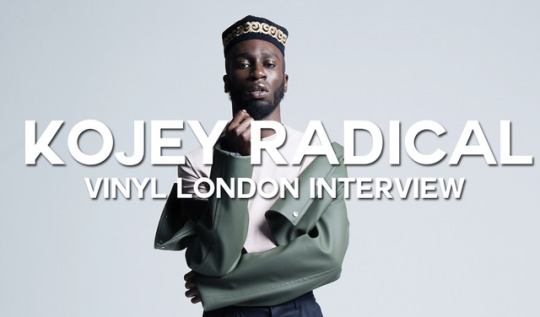
This article was written for the (now offline) magazine wesbite vlmedia.co.uk
__
There is something wholly intoxicating about the work of this East London artist, everyone who hears Kojey Radical’s music seems to connect with it in one way or another. His 2014 release ‘Dear Daisy EP’ captivated the ears of many, with a voice like Stormzy, a mind like Dostoevsky and a flow like no other.
Since this release however there hasn’t been a lot in the way of music coming out of the young creative’s camp, until his latest single ‘BAMBU’ and the accompanying video came out last month. In this new track Kojey uses a more trap-influenced beat than on his previous work and a slightly more aggressive lyrical style, addressing issues from racial injustice through to sexism. The video, directed by ‘The Rest’ is just as enticing as the spoken word rap itself as Kojey walks through London estates and rooftops painted entirely in black and moving in free flowing jerks.
“I wrote this piece as an ode to the thoughts about society people often ignore. As soon as we wrapped it up we were instantly met with this feeling that this record is important. I’ve heard it described as a societal soliloquy or a stream of consciousness on the first listen. I found that interesting. The hybrid of poetry and thumping almost trap like beat… The intensity of the delivery…Art shouldn’t compromise
Bambu is uncompromising.” – Kojey Radical
Kojey is also the creative director of PUSHCRAYONS creative arts agency and plays a role as art director for the brand Chelsea Bravo, showing that the seed of his creativity is sown over many fields.
Clearly your talents lie all over several art forms, but which do you identify yourself as most - musician, designer, poet, producer etc.?
I identify myself as an artist, My talents are almost like tools of the trade. I began as an artist before I moved into working with music and poetry but I’ve always seen my skill set as just new ways to express myself.
When you were growing up what kind of music were you listening to and did this have an effect on which direction you took when you started making music?
I was listening to all sorts, grew up around a lot of hip hop, motown & blues. My brother was a DJ so I’d watch him as he practiced; I got older and started listening to a lot more indie rock, jazz and future garage. I think when I started making music I just wanted to channel sounds that made you feel something. Because I listened to so many different kinds of music I wanted my music to be eclectic, no one listens to just one genre so I didn’t want my music described as a genre. I wanted it to be described as an experience.
And what about other art, were there any particular painters or poets or writers who influence you?
I was heavily inspired by painters like Egon Schiele, Paul Gaugin & Clyfford Still as well as Jean Michelle Basquiat, Kaws, & Takeshi Murakami. Artists that focused in on expressionism and being more figurative then most. I didn’t actually read the work of many writers. I loved Shakespeare & Benjamin Zephaniah, Gil Scott Heron was a massive inspiration on my work.
Coming from East London yourself, what is your favourite part of being in London with relation to music?
It’s alive right now, so many great artists to be inspired by and to interact with. London is very diverse, and there’s always something to see and do. We’re very open to difference I find, a lot more so than other cities - plus it keeps you on your toes.
Your music has a strong theme or a message, where did the theme of ‘bitter love’ (?) for the 'Dear Daisy: Opium EP’ come from?
Experience. I want to discuss subjects in a way that acts as a contribution to the literature that already exists and love is a subject that has been discussed in every conceivable way possible. The one thing that allows it constantly feel fresh is empathy, if you can relate to people through experience you can make them feel something.
Your music separates itself from almost everything else in the mainstream at the moment, did this come from your own creative freedom or from actively trying to differ yourself from the rest?
Creating is fuelled by freedom. I would never actively try and be different; I think the fact so much is created with need to be accepted these days that when something sounds like an honest expression it’s either marveled or labeled. I just create because it’s all I have, it’s all I’m good at & whether or not that fits into the mainstream will never be my concern.
What’s next for you in your creative journey? Are you continuing with music and will you stick with the same concept as 'Dear Daisy’?
The new project does exist in the same world as Dear Daisy, I’m still working on new music. I wanted to take the time to get it right and give people something that sits with them for a long time and means something. Dear Daisy is over a year old and still reaches and touches people on a daily basis and that’s all I could ever ask for.
Words By Alex Wallace
0 notes